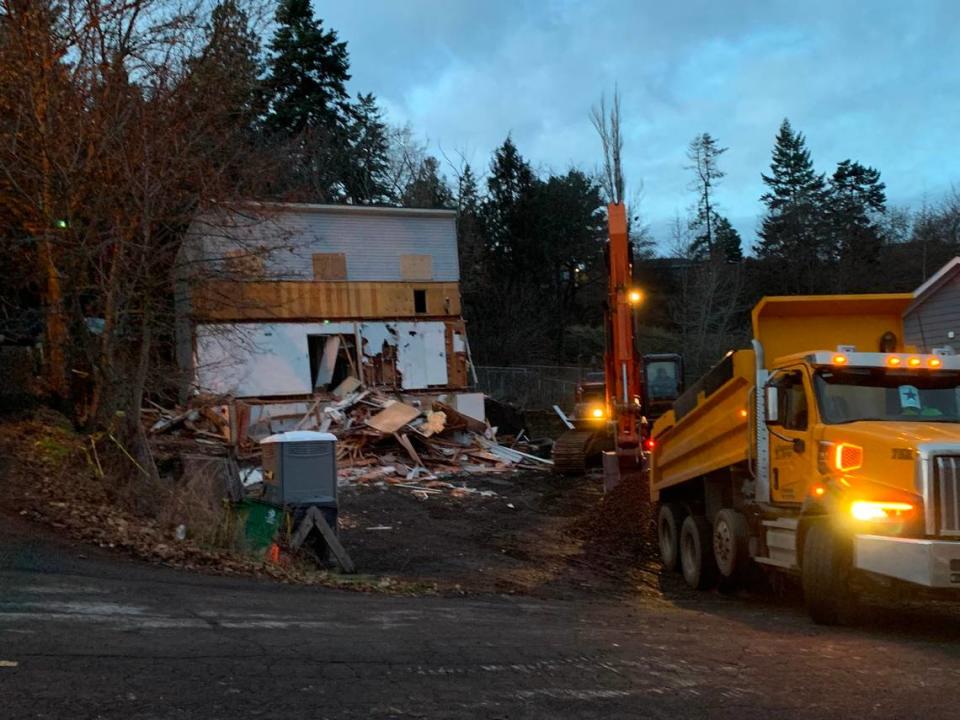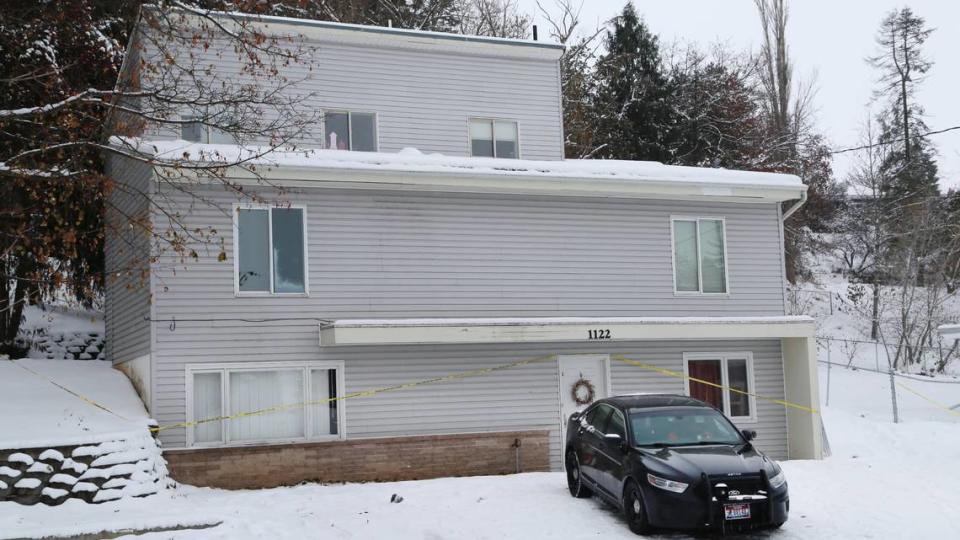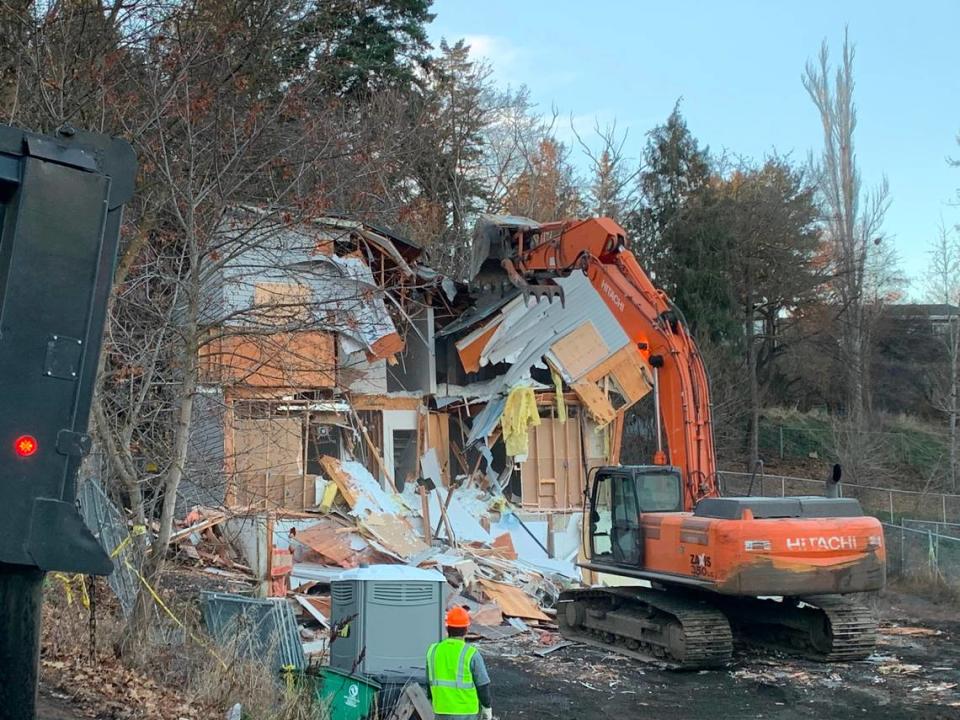House where University of Idaho students killed torn down. Victims’ families opposed it
Demolition of the off-campus home where four University of Idaho students were killed last year began Thursday morning over continued protests from at least half of the victims’ families.
Work to bring down the unique property got underway before dawn. The noise from the heavy machinery pierced the nearby campus as a local construction firm used an excavator to rip away portions of the facade, starting at the front door.
By the scheduled start time of 7 a.m. Pacific, as dozens of members of the media arrived to encircle the boarded-up property and train their cameras toward the wreckage, half of the King Road home was on the ground. About an hour later, the former residence was almost entirely gone.
The house, a six-bedroom, three-bathroom rental located less than 600 feet from the university’s new Greek row, was the site of the November 2022 quadruple homicide — one of the most talked about crimes in state history. The victims were U of I seniors Kaylee Goncalves and Madison Mogen, both 21, and junior Xana Kernodle and freshman Ethan Chapin, both 20.
The three women were tenants of the home with two female housemates who were not physically harmed in the fatal stabbings. Chapin was Kernodle’s boyfriend and stayed over for the night.
Bryan Kohberger, a graduate student at Washington State University in neighboring Pullman, Washington, at the time, was arrested and charged with the crime in late December 2022. He stood silent when asked to enter a plea, which led to a not guilty plea on his behalf.
Kohberger, 29, a Pennsylvania native, could face the death penalty if convicted. A trial date has yet to be set.
In the spring, the private owner of the house at 1122 King Road donated the property to the university, and the school made plans for its destruction. After the home was left standing for more than a year, U of I committed to knocking it down and announced earlier this month a Thursday demolition date.
“Frankly, many of our students live in that area,” U of I President Scott Green told the Idaho Statesman in an interview Thursday. “For us, just bringing it down was an important part of healing for our community. … We have to live in this community, so from our standpoint it was the right decision for our community.”

Debate over U of I’s decision
The university’s decision — a contentious one ahead of a trial date — has drawn widespread scrutiny. In social media groups and threads dedicated to the case, discussion over how the U of I should handle what became the primary symbol of the high-profile incident grew into a flash point.
At least some of that debate was driven by three of the four victims’ families voicing concerns in recent months about the university razing the scene of the crime before jurors have the chance to decide if visiting may be helpful. An online petition against the home’s destruction amassed more than 9,000 signatures. One petition supporter identified herself as Cara Kernodle, Xana Kernodle’s mother.
“My daughter was murdered in that house and there is no way they should be destroying any evidence,” the post read.

The Goncalves and Kernodle families issued a lengthy statement through an attorney the night before the home was scheduled to be torn down. It was titled: PLEASE STOP THE DEMOLITION OF THE KING ROAD HOME!
“We feel that the University of Idaho and the court has put us in a horrible position to have to voice our opinions,” the statement read in part. “We all along have just wanted the King Road home to not be demolished until after the trial and for us to have a trial date so that we can look forward to justice being served. Is that really too much to ask?”
Also, Shanon Gray, the Goncalveses’ attorney, provided a statement in June that opposed the home’s destruction and cited “members of the Mogen and Kernodle families.” A member of the Chapin family did not respond to a Statesman request for comment. Benjamin Mogen, Madison Mogen’s father, declined to comment.
In response to the pushback, U of I spokesperson Jodi Walker told the Statesman in a statement Wednesday that the school understands the gravity of the decision and its unique effect on the four victims’ families. However, efforts to knock down the King Road home would continue as planned.
“We certainly appreciate that there is a lot of emotion around the demolition of the house,” Walker said. “No one feels that more than the families. But, we feel confident this is the right time for our community to take the next step in healing and for the house to come down.”
The university has heard from several students in the area of the home who requested it be razed, she said.

The court released the property, and neither the defense nor prosecution in the case objected to leveling the home, the university has previously noted. After this month’s demolition announcement, each side visited the crime scene once more — the prosecution most recently.
Latah County Prosecutor Bill Thompson, lead on the Kohberger case, thanked the university for its assistance accessing the crime scene last week in an email provided by Walker to the Statesman. The prosecution expected no need of the property going forward, Thompson wrote.
“Based on our review of Idaho case law, the current condition of the premises is so substantially different than at the time of the homicides that a ‘jury view’ would not be authorized,” Thompson said. “We appreciate the UI’s help in facilitating the investigators gathering the necessary measurements, etc., to enable creation of illustrative exhibits that should be admissible and helpful to the jury.”
There are no current plans for the former residential site, Walker said. Removing the home was the first step before the land is graded and seeded with grass, and left vacant for the foreseeable future, she said.
Kohberger is charged with four counts of first-degree murder and one count of felony burglary. He remains in custody at the Latah County Jail awaiting trial.

